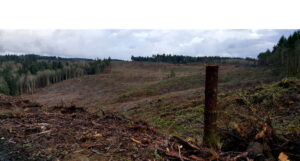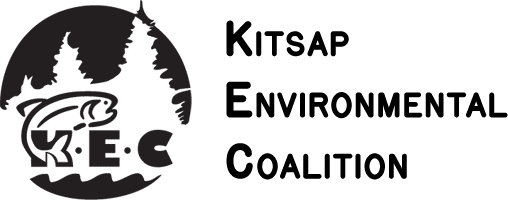 Previous issues of Now Hear This have outlined the unsustainable practices of timber corporations in our area. What’s perhaps more egregious is the role of government itself.
Previous issues of Now Hear This have outlined the unsustainable practices of timber corporations in our area. What’s perhaps more egregious is the role of government itself.
When deforestation is contributing to
—climate change through robbing the planet of its ability to sequester carbon,
—the rapid extinction of thousands of species of wildlife,
—and the depleting of soil and water,
do you think our state government is looking out for us, working on possible solutions to threats to our existence that are the consequence of deforestation?
Nooooooo. For one thing, Washington state’s Department of Natural Resources (DNR) has actually been complicit in Pope’s clearcutting and spraying, instructing them how to circumvent state oversight regulations as they apply for permits to spray poison herbicides.
For another, the enforcement of existing rules and regulations has been lax at best—an example being the October helicopter-spraying of people and cars near City Lake outside of Port Townsend. Local law enforcement refused to come to the scene, and an inspector from the state didn’t show up for 3 days, and then when he did, he stated that evidence could have been tainted in the meantime. So no action was taken against Pope.
But here’s the most outrageous issue, which is also the most far-reaching. DNR’s “management” of state forest land entails cutting it down! for profit! Once per month, the Board of Natural Resources (BNR), which oversees the policies and actions of the DNR, meets in Olympia to make decisions on parcels of state forest lands.
The revenue gained from timber sales funds state operations such as schools and colleges, school construction, prisons, counties, and state buildings in Olympia. The pie chart on DNR’s site shows that the vast majority of its funds going to support public schools. There’s more than a little irony to the notion that our children’s education is paid for by cutting down trees that produce the oxygen they’d breathe after we’re gone.
Extrapolate the philosophy of this “routine” function of government that underpins the BNR’s activities. Our trees and wildlife are a giant ATM for the state government to draw from. Trees equal money.
An opposing philosophy, given the world’s climate crisis that’s approaching the point of no return if it hasn’t already, holds that these forest lands are priceless, essential to our survival. They shelter and preserve the richness of soil, water, biological diversity, oxygen, and—not to be sentimental—beauty. It’s past time for state officials to retrofit existing laws, policies, and practices to mitigate human contributions to climate change. Australia’s ongoing conflagration is more than a wake-up call.
A professor in Calcutta calculated that a tree is worth $193,250; his conclusions have become an Internet meme. “A tree living for 50 years will generate $31,2350 worth of oxygen, provide $62,000 worth of air pollution control, control soil erosion and increase soil fertility to the tune of $31,230, recycle $37,500 worth of water, and provide a home for animals worth $31,230.” Of course one can debate the figures reached by Professor Das: the economic value of a tree might be gauged by any number of variable factors. The point is that trees are worth far more to humanity and the environment than their market value as wood products.
“Trees and plants silently carry out their daily routines year after year, stabilizing the soil, recycling nutrients, cooling the air, modifying wind turbulence, intercepting the rain, absorbing the toxins, reducing fuel costs, neutralizing sewage, increasing property values, enhancing social awareness, providing beauty, cutting noise, giving privacy, promoting tourism, encouraging recreation, reducing stress, and improving personal health as well as providing food, medicine and homes for other living things…. It’s unlikely that a tree valuation formula will ever be devised that is acceptable to everyone, but the principle is that our green assets are valuable in diverse and subtle ways.”
Since current economic models such as that of the BNR attach little value to the environment, they fail to take these values into consideration when they prescribe the “managed” mowing down of forests.
The director of the BNR is Washington’s Commissioner of Public Lands, Hilary Franz. This past fall, Washington Environmental Coalition presented her a detailed document outlining a coherent policy for mitigating and adapting to climate change in Washington State. WEC offered to work collaboratively in support of the state’s implementation of the plan. Franz didn’t even share that plan with her board members on the BNR. But we (KEC) stepped up and sent them WEC’s proposal. Commissioner Franz said she had her own plan addressing climate change. But where is it? We need immediate retrofitting of state policies and practices that reflect the reality of climate change.
Commissioner Franz did not intercede when we provided evidence of her own agency’s collusion with private industry. That was a year and a half ago. We’ve reached out on several occasions, and she still refuses to address that issue. The fact that DNR submits logging applications to itself for approval, without outside oversight, is beyond ludicrous. Her current campaign to mitigate wildfires is commendable, but if she’s concerned about saving forests from fire, why isn’t she concerned about saving them from her own agencies’ saws?
It’s literally sickening to think about the systematic destruction of the natural environment being carried out at the federal level right now.
Other national governments do not engage in such unbridled folly. Norway is the world’s first country to ban deforestation. (The other Scandinavian countries, and Germany, aren’t far behind.) Norway today has triple the amount of standing wood in forests than it had 100 years ago—largely because of its carefully managed forest policy since 1919. Its forest growth is enough to offset roughly 60% of the country’s annual greenhouse gas emissions.
Scientists recently noted if we were to engage in a massive restoration of the world’s forest, planting 1.2 trillion trees, we could cancel a decade of CO2 emissions.[1]
Our state and federal governments are going in exactly the opposite direction. Is this a form of suicide?
IN OTHER NEWS:
Pope Resources is being sold to mega-timber corporation Rayonier. The acquisition is slated to be complete by mid-2020. It’s unclear how the current shareholder lawsuit against Pope for undervaluation of the sale might affect these changes.
The Port Gamble S’Klallam tribe announced its purchase of 937 acres of Pope land near Hansville. Pope has retained rights to harvest timber on this land for 15 years; and sadly, we hear the noise of the saws there going full tilt as we write. But it’s heartening to know that in the long run, that land’s original caretakers will bring the forest back to health.

